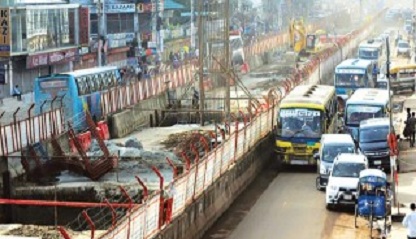
City-centric development backfires

left Dhaka bag and baggage last month for his home town at Ghatail in Tangail bringing an abrupt end to his long stay in the capital where he came two decades ago to make his fortune.
He told that he had no other ways since the company he worked for — a garment factory in the city’s Mirpur area — slashed his 60 per cent salary as part of cost-cutting measures to survive the COVID-19 economic fallout.
The drastic cut in salary made it impossible for him to maintain the flat he had been renting for the last 14 years at Nakhalpara as well as other expenses for his five-member family.
Back in the village home Anwar said he felt depressed since he knew that he would not get much scope for the kind of work he would enjoy as was the case when he was in the capital.
Additionally, there are no opportunity in the village for schooling of his three children.
Anwar is one of thousands who were forced to leave Dhaka and other major cities as they could not carry the burden of expenses amid the financial fallout after the new virus outbreak affected all spheres of life.
Most such white-collar workers left for ancestral homes in the villages where they will not get work other than those in the agricultural and trading sector.
The situation of these people, who once migrated to the cities seeking livelihoods, indicates chronic negligence in development of the villages.
To generate more jobs in small towns and villages higher investment was a must, said Bangladesh Institute of Development Studies research director Binayak Sen.
But the subsequent governments failed to do so.
It should have been realised that higher investment in villages and towns could ensure balanced development, a much-needed criterion for tackling any kind of adverse economic situation, he added.
‘Creating job opportunities became complicated as the number of jobless people is only growing during the current epidemic after the country was facing high unemployment rate among the educated youth even in the pre-COVID-19 period,’ he observed.
A recent survey by BIDS said about 13 per cent people become unemployed in the country due to COVID-19 outbreak.
It noticed significant negative effects on employment, income and expenditures of people, especially those from low-income groups.
As per the report findings, 19.23 per cent of participants with income less than 5,000 taka reported that their income reduced by 75 per cent, while 23.31 per cent participants with income between 5,000-15,000 taka reported an income reduction by 50 per cent relative to last month’s income.
A BRAC survey done in May said that loss in income was somewhat greater in urban areas (79 per cent) than in the rural ones (75 per cent) while 95 per cent people across the country suffered a substantial loss in their income.
Unable to pay house rent of Tk 20,000, Abdullah and his five other family members went back to Noalkahi in June as his income from a readymade garment showroom in Mirpur dipped while his expatriate father stopped sending remittance from the Saudi Arabia.
Going back to the village is unfortunate for Abdullah’s mother, who is suffering from health-related complications and was dependent on the medicare facility available in the capital, where the family has been resident at Uttar Badda for the last 15 years.
Like Abdullah, many other Dhaka residents have faced this tragedy of leaving the city and the outflux continues while an estimated 50,000 tenants already left the city due the COVID-19-induced shutdown and its economic impact.
Economists and governance campaigners said these people would not have faced such tragic situations if they were able to get jobs, education, treatment and entertainment facilities in their ancestral villages and towns.
Transparency International Bangladesh trustee board member Ali Imam Majumder said the COVID-19 epidemic proved that the development that ensued since the country’s independence was centred on the few big cities as policies followed by the successive governments neglected the areas where the vast majority of the people lived.
Over the years, many more cities should have been developed with better education and healthcare facilities which would have generated jobs there, lamented Imam, also a former cabinet secretary.
Industries, manufacturing units, readymade garments factories have grown indiscriminately, mainly in the capital and Chittagong, as the cities have been drawing higher investments over the years.
According to the Centre for Urban Studies honorary chairman professor Nazrul Islam Dhaka was disproportionally urbanised in comparison to other cities.
This has resulted in many problems like high internal migration, population boom, an increase in number of slums, traffic congestion, environmental pollution and encroachment of riv
Editor & Publisher: S. M. Mesbah Uddin
Published by the Editor from House-45,
Road-3, Section-12, Pallabi, Mirpur
Dhaka-1216, Bangladesh
Call: +01713180024 & 0167 538 3357
News & Commercial Office :
Phone: 096 9612 7234 & 096 1175 5298
e-mail: financialpostbd@gmail.com
HAC & Marketing (Advertisement)
Call: 01616 521 297
e-mail: tdfpad@gmail.com